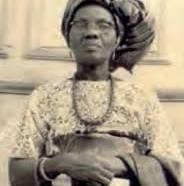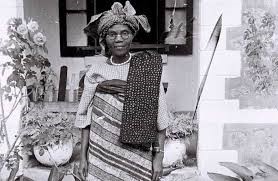Funmilayo Ransome-Kuti (1900-1978), often referred to as the ‘Mother of Nigeria,’ played a prominent role in Nigeria’s resistance against British colonial rule. Beyond being recognized solely as the mother of Afrobeat icon Fela Kuti or for her symbolic achievement as the first Nigerian woman to drive a car—an accolade commonly taught in Nigerian schools—Funmilayo Ransome-Kuti was a formidable figure in her own regard. She was an educator, a pioneer in feminism, and a committed political activist, earning her the moniker ‘Lioness of Lisabi.’
In 1949, she spearheaded a protest challenging the authority of local leaders, particularly targeting the Alake of Egbaland. She presented evidence of the Alake’s misuse of power, as he had been empowered by colonial administrators to levy taxes. Oba Ladapo Ademola, who ascended to the throne as the Alake of Egbaland in 1920 with 89 crowns, was central to this conflict.
This unrest stemmed from Governor-General Lugard’s 1918 introduction of direct taxation and the establishment of the Sole Native Authority. This system, akin to today’s local government structure, employed traditional rulers as intermediaries for the colonial administration. The Alake of Egbaland was at the helm of this authority.
The establishment of the Sole Native Authority significantly augmented the authority of the Alake, as previous checks and balances on his power were gradually dismantled. Under the new system of indirect rule, traditional arbiters such as kingmakers, chiefs, and priests lost their ability to curb the Alake’s potential abuse of authority, as they became reliant on the Sole Native Authority for their appointments to advisory councils.

Historically, women in Egba society played active roles in politics, with their own representatives, notably the Iyalode on state councils tasked with safeguarding and advancing women’s interests. However, with the arrival of the British, women’s contributions were disregarded, and no provisions were made for their participation in governance. While titles like Iyalode and Erelu persisted, they were stripped of substantive power and influence.
Taxation emerged as a pivotal concern for Egba women. Despite shouldering a significant burden in district revenues, they found themselves excluded from direct representation on the Sole Native Authority council, a situation they vehemently opposed. Moreover, the manner in which taxes were levied often involved humiliation, violence, and the exploitation of women, including the intrusive practice of assessing their age through degrading means such as stripping.
Over time, grievances among women escalated to a point where they believed that adopting a more assertive stance was their sole recourse for addressing their concerns. They perceived taxation as foreign, unjust, and burdensome, and objected to the methods employed in its collection. This particular issue propelled Funmilayo Ransome-Kuti into the political spotlight, initially in Abeokuta and subsequently across Nigeria.
In 1923, Ransome-Kuti established the Abeokuta Ladies Club, comprising educated middle-class women, predominantly Christians, who focused on activities such as crafts and social decorum. Between 1943 and 1944, the club underwent a transformation, welcoming market women who sought Ransome-Kuti’s assistance in addressing their challenges. Many of these women were illiterate. It was during this period that Ransome-Kuti embarked on her political activism, with a primary aim of elevating the status of women in Abeokuta, promoting adult education, and eradicating illiteracy from the community.

Deeply disturbed by reports of exploitation and suffering inflicted by colonial authorities and native leaders, as well as harassment by police officers in Egbaland, Funmilayo Ransome-Kuti uncovered instances of corruption within the traditional leadership. She learned that the Alake of Abeokuta, the local ruler, was diverting rice confiscated from women to his own stores, selling it, and pocketing the proceeds for personal gain..
In 1946, faced with oppressive taxation, the Abeokuta Ladies Club transformed into the Abeokuta Women’s Union, aiming to challenge colonial rule and the dominance of men. They resisted price controls and direct taxation, using press campaigns and mobilization to pressure the Alake. The union, characterized by organization and discipline, orchestrated mass refusal to pay taxes, prompting a harsh response from authorities, including tear gas and beatings. Funmilayo Ransome-Kuti conducted training sessions to counter these threats, teaching women how to protect themselves from tear gas effects and retaliate against authorities.
Under Funmilayo’s leadership, the women demanded an end to direct taxation on Abeokuta women and sought representation in local politics and governance, believing women’s involvement was crucial in decision-making. Initially dismissed by the Alake as mere ranting, Funmilayo proved them wrong by leading protests from 1946 to 1948 against female taxation, lack of female representation in native authority, and even certain business interests of the Alake. She persistently advocated for women’s rights and representation, calling for the taxation of foreign companies, abolition of native authority, and the establishment of a representative government ensuring women’s interests were adequately represented.
Despite sending numerous petitions to the Alake, Funmilayo’s pleas went unheard. In 1946, the group escalated their efforts by sending a delegation to present their demands directly. However, instead of addressing the women’s concerns, the Alake exacerbated the situation by increasing taxation on them.
In response to the escalating oppression, the royal court issued a decree requiring property-owning women to pay income tax, leading Funmilayo to denounce the Alake as a dictator. She rallied her fellow women, urging them to prepare for confrontation.
In October 1946, approximately 1000 women marched to the Alake’s palace to protest. However, British police intervened brutally, using tear gas and violence to disperse the demonstrators. Despite the repression, Funmilayo continued to lead the anti-tax protest, remaining steadfast in her determination.
In 1947, Funmilayo defied tax demands and was subsequently arrested. Yet, at her trial, she pleaded not guilty, drawing immense support from thousands of women who gathered outside the courthouse in solidarity. The following year, she again refused to pay taxes as protests persisted.
According to Dunamis, another Nigerian blogger, the women drew strength from the Alake’s actions, fueling their resolve to protest more aggressively. During this period, they released a document outlining their grievances against the Alake and the native authority, further amplifying their demands for change.
The subsequent form of protest unfolded in a novel manner, astonishing both the Alake and the wider community. Spanning over 48 hours at the Alake’s palace, it commenced on November 29, 1947, with more than 10,000 women, led by Funmilayo Ransome-Kuti, vehemently expressing their grievances outside the palace gates. They vocally denounced the Alake while the British authority attempted to mediate, urging the king to extend an olive branch to ease the community’s discomfort caused by the resolute stance of the women. False assurances regarding the suspension of the contentious tax were given, but when exposed as deception, the women, now over 10,000 strong, intensified their protest, demanding the release of their detained peers. This continued for two days until the detained women were freed by December 10th.
In January 1948, Kuti was banned from the palace for insulting the Alake, a decision supported by the British administration. Efforts to sway the Abeokuta Women’s Union from its support of Kuti failed, and they refused to engage in any discussions without her presence. By April, the women were resolute in their determination to oust the Alake and achieve their demands, including his removal from office. They persisted in their demonstrations, even threatening to march unclothed, a taboo in Egbaland.
Empowered by a symbolic gesture involving a staff believed to hold mystical powers, Kuti rallied the women, instilling fearlessness and courage. This reputation drew 20,000 women to join her in confronting the Alake at his palace, where they boldly asserted their autonomy, challenging traditional gender roles. Through persistent protests and petitions calling for the Alake’s removal, he eventually abdicated in 1949, entering self-exile for a year before returning to the throne in 1950, where he wisely avoided confrontation with the women and their formidable leader, Funmilayo Ransome-Kuti.
In February 1977, Fela Kuti, the son of Funmilayo Ransome-Kuti, once again angered the military government with his music. Approximately 1000 soldiers raided Kuti’s compound in Lagos, causing damage to property and assaulting residents, including Ransome-Kuti herself, who was thrown from a second-story window. She suffered injuries that ultimately led to her death in April 1978 after being hospitalized.
Her funeral, held in Abeokuta, drew thousands of attendees. Many market women closed their shops and entire markets across the city to commemorate her passing. The media was filled with accolades, describing her as a “progressive revolutionary” and a “Pan-African visionary”.
Sources
- https://www.africarebirth.com/meet-funmilayo-ransome-kuti-the-formidable-nigerian-activist-who-simultaneously-fought-for-womens-rights-and-her-nations-freedom/
- https://www.withinnigeria.com/2018/06/05/funmilayo-ransome-kuti-evicted-alake-of-egbaland-from-throne/?amp=1
- https://famefoundationwg.org/2023/03/03/how-funmilayo-ransom-kuti-sacked-alake-of-egbaland-in-1949/
- https://en.m.wikipedia.org/wiki/Funmilayo_Ransome-Kuti




